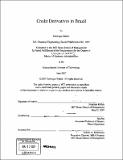| dc.contributor.advisor | Jun Pan. | en_US |
| dc.contributor.author | Rüther, Henrique | en_US |
| dc.contributor.other | Sloan School of Management. | en_US |
| dc.date.accessioned | 2007-11-16T14:15:43Z | |
| dc.date.available | 2007-11-16T14:15:43Z | |
| dc.date.copyright | 2007 | en_US |
| dc.date.issued | 2007 | en_US |
| dc.identifier.uri | http://hdl.handle.net/1721.1/39511 | |
| dc.description | Thesis (S.M.)--Massachusetts Institute of Technology, Sloan School of Management, 2007. | en_US |
| dc.description | Includes bibliographical references (p. 40-42). | en_US |
| dc.description.abstract | The amounts outstanding of credit derivatives have grown exponentially over the past years, and these financial intruments that allow market participants to trade credit risk have become very popular in Europe and in the United States. Although the Central Bank of Brazil passed regulation in 2002 allowing the trade of credit derivatives in the domestic market, almost nothing happened in this arena, and the credit derivatives market in Brazil barely exists. This thesis aims at investigating why such a market has not developed in one of the largest economies of the world. The thesis starts by explaining the mechanism of one of the most popular credit derivatives - the credit default swap (CDS). Then, since bonds and CDS are closely related, the thesis provides short descriptions of the Brazilian market for government issued bonds and corporate bonds. Subsequently we assess the Brazilian regulation for credit derivatives and start to find some reasons why the market has not been developed. We then approach a real life example of estimating the CDS premium for a local company using the no-arbitrage argument and compare the results with the premium of the offshore CDS available for the same company. | en_US |
| dc.description.abstract | (cont.) We find that the credit rating upgrades do not explain the changes in the domestic credit spread for the chosen company. Moreover, we observe that the domestic credit spread behaved very differently from the offshore CDS for the same entity, what suggests that more research on this direction would be interesting. Subsequently we address the benefits and risks provided by credit derivatives and examine the current situation of the market for these financial instruments in Mexico and Korea. We found that the Central Bank of Brazil imposed restrictions to some market participants in the credit derivatives market and allowed only two products to be traded: CDS and total return swaps. These restrictions, together with a not very liquid corporate bond market and the lack of reforms granting for example stronger rights to secured and unsecured debt holders may be the reason why the credit derivatives market did not flourish in Brasil. | en_US |
| dc.description.statementofresponsibility | by Henrique Rüther. | en_US |
| dc.format.extent | 50 p. | en_US |
| dc.language.iso | eng | en_US |
| dc.publisher | Massachusetts Institute of Technology | en_US |
| dc.rights | M.I.T. theses are protected by copyright. They may be viewed from this source for any purpose, but reproduction or distribution in any format is prohibited without written permission. See provided URL for inquiries about permission. | en_US |
| dc.rights.uri | http://dspace.mit.edu/handle/1721.1/7582 | |
| dc.subject | Sloan School of Management. | en_US |
| dc.title | Credit derivatives in Brazil | en_US |
| dc.type | Thesis | en_US |
| dc.description.degree | S.M. | en_US |
| dc.contributor.department | Sloan School of Management | |
| dc.identifier.oclc | 173845070 | en_US |
